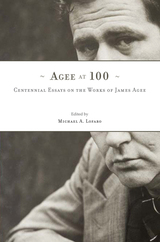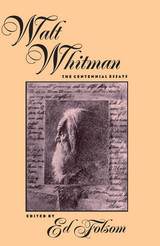
Drawn mainly from the centennial anniversary symposium on James Agee held at the University of Tennessee in the fall of 2009, the essays of Agee at 100 are as diverse in topic and purpose as is Agee’s work itself. Often devalued during his life by those who thought his breadth a hindrance to greatness, Agee’s achievements as a poet, novelist, journalist, essayist, critic, documentarian, and screenwriter are now more fully recognized. With its use of previously unknown and recently recovered materials as well as established works, this groundbreaking new collection is a timely contribution to the resurgence of interest in Agee’s significance.
The essays in this collection range from the scholarly to the personal, and all offer insight into Agee’s writing, his cultural influence, and ultimately Agee himself. Dwight Garner opens with his reflective essay on “Why Agee Matters.” Several essays present almost entirely new material on Agee. Paul Ashdown writes on Agee’s book reviews, which, unlike Agee’s film criticism, have received scant attention. With evidence from two largely unstudied manuscripts, Jeffrey Couchman sets the record straight on Agee’s contribution to the screenplay for The African Queen and delves as well into his television “miniseries” screenplay Mr. Lincoln. John Wranovics treats Agee’s lesser-known films--the documentaries In the Street and The Quiet One and the Filipino epic Genghis Khan. Jeffrey J. Folks wrestles with Agee’s “culture of repudiation” while James A. Crank investigates his perplexing treatment of race in his prose. Jesse Graves and Andrew Crooke provide new analyses of Let Us Now Praise Famous Men, and Michael A. Lofaro and Philip Stogdon both discuss Lofaro’s recently restored text of A Death in the Family. David Madden closes the collection with his short story “Seeing Agee in Lincoln,” an imagined letter from Agee to his longtime confidante Father Flye.
The contributors to Agee at 100 utilize materials new and old to reveal the true importance of Agee's range of cultural sensibility and literary ability. Film scholars will also find this collection particularly engrossing, as will anyone fascinated by the work of the author rightly deemed the “sovereign prince of the English language.”
Michael A. Lofaro is Lindsay Young Professor of American Literature and American and Cultural Studies at the University of Tennessee. Most recently, he restored James Agee’s A Death in the Family and is the general editor of the projected eleven-volume The Works of James Agee.

In 1992, the year of the hundredth anniversary of Walt Whitman's death, a major gathering of international scholars took place at the University of Iowa. Over 150 participants heard papers by 20 of the world's most eminent critics of Whitman. Three generations of scholars offered new essays that brilliantly tracked the course of past and present Whitman scholarship. So significant was this historic celebration of the great American poet that the opening session was covered by CBS “Sunday Morning,” National Public Radio's “Morning Edition,” the New York Times, and other newspapers across the country. Musical and theatrical performances, art exhibitions, slide shows, readings, songs, and even a recently discovered recording of Whitman's voice were presented during the three days of the conference.
But the heart of the conference was this series of original essays by some of the most innovative scholars working in the field of American literature. There has ever been a more important collection of Whitman criticism. In these essays, readers will find the most suggestive recent approaches to Whitman alongside the most reliable traditional approaches. Walt Whitman: The Centennial Essays captures Whitman's energy and vitality, which have only increased in the century after his death.
READERS
Browse our collection.
PUBLISHERS
See BiblioVault's publisher services.
STUDENT SERVICES
Files for college accessibility offices.
UChicago Accessibility Resources
home | accessibility | search | about | contact us
BiblioVault ® 2001 - 2024
The University of Chicago Press









